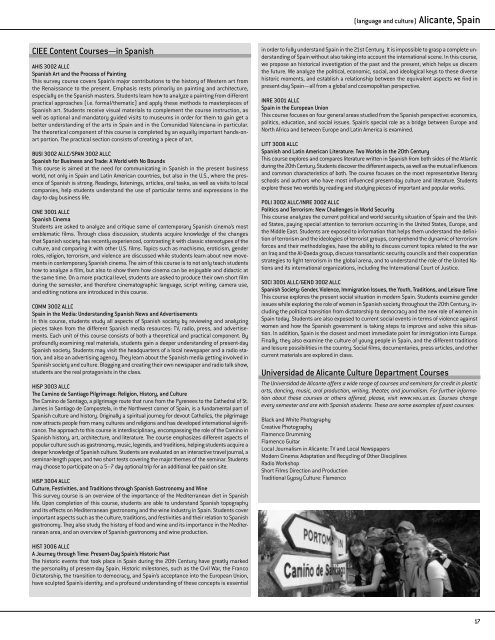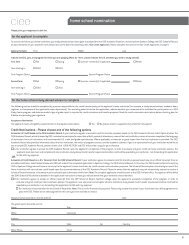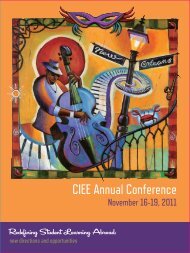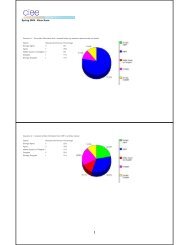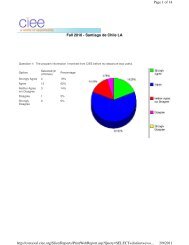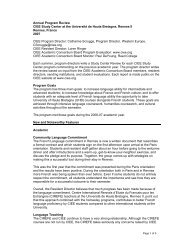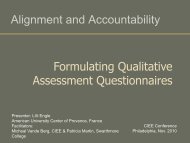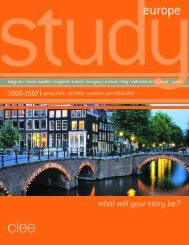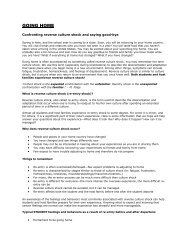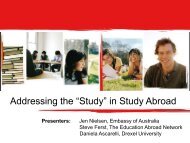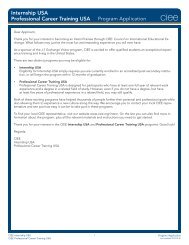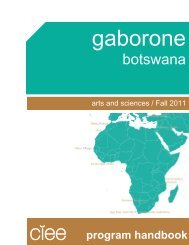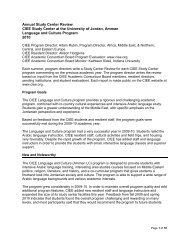study spain - Council on International Educational Exchange
study spain - Council on International Educational Exchange
study spain - Council on International Educational Exchange
You also want an ePaper? Increase the reach of your titles
YUMPU automatically turns print PDFs into web optimized ePapers that Google loves.
(language and culture) Alicante, Spain<br />
CIEE C<strong>on</strong>tent Courses—in Spanish<br />
AHIS 3002 ALLC<br />
Spanish Art and the Process of Painting<br />
This survey course covers Spain’s major c<strong>on</strong>tributi<strong>on</strong>s to the history of Western art from<br />
the Renaissance to the present. Emphasis rests primarily <strong>on</strong> painting and architecture,<br />
especially <strong>on</strong> the Spanish masters. Students learn how to analyze a painting from different<br />
practical approaches (i.e. formal/thematic) and apply these methods to masterpieces of<br />
Spanish art. Students receive visual materials to complement the course instructi<strong>on</strong>, as<br />
well as opti<strong>on</strong>al and mandatory guided visits to museums in order for them to gain get a<br />
better understanding of the arts in Spain and in the Comunidad Valenciana in particular.<br />
The theoretical comp<strong>on</strong>ent of this course is completed by an equally important hands-<strong>on</strong>art<br />
porti<strong>on</strong>. The practical secti<strong>on</strong> c<strong>on</strong>sists of creating a piece of art.<br />
BUSI 3002 ALLC/SPAN 3002 ALLC<br />
Spanish for Business and Trade: A World with No Bounds<br />
This course is aimed at the need for communicating in Spanish in the present business<br />
world, not <strong>on</strong>ly in Spain and Latin American countries, but also in the U.S., where the presence<br />
of Spanish is str<strong>on</strong>g. Readings, listenings, articles, oral tasks, as well as visits to local<br />
companies, help students understand the use of particular terms and expressi<strong>on</strong>s in the<br />
day-to-day business life.<br />
CINE 3001 ALLC<br />
Spanish Cinema<br />
Students are asked to analyze and critique some of c<strong>on</strong>temporary Spanish cinema’s most<br />
emblematic films. Through class discussi<strong>on</strong>, students acquire knowledge of the changes<br />
that Spanish society has recently experienced, c<strong>on</strong>trasting it with classic stereotypes of the<br />
culture, and comparing it with other U.S. films. Topics such as machismo, eroticism, gender<br />
roles, religi<strong>on</strong>, terrorism, and violence are discussed while students learn about new movements<br />
in c<strong>on</strong>temporary Spanish cinema. The aim of this course is to not <strong>on</strong>ly teach students<br />
how to analyze a film, but also to show them how cinema can be enjoyable and didactic at<br />
the same time. On a more practical level, students are asked to produce their own short film<br />
during the semester, and therefore cinematographic language, script writing, camera use,<br />
and editing noti<strong>on</strong>s are introduced in this course.<br />
COMM 3002 ALLC<br />
Spain in the Media: Understanding Spanish News and Advertisements<br />
In this course, students <str<strong>on</strong>g>study</str<strong>on</strong>g> all aspects of Spanish society by reviewing and analyzing<br />
pieces taken from the different Spanish media resources: TV, radio, press, and advertisements.<br />
Each unit of this course c<strong>on</strong>sists of both a theoretical and practical comp<strong>on</strong>ent. By<br />
profoundly examining real materials, students gain a deeper understanding of present-day<br />
Spanish society. Students may visit the headquarters of a local newspaper and a radio stati<strong>on</strong>,<br />
and also an advertising agency. They learn about the Spanish media getting involved in<br />
Spanish society and culture. Blogging and creating their own newspaper and radio talk show,<br />
students are the real protag<strong>on</strong>ists in the class.<br />
HISP 3003 ALLC<br />
The Camino de Santiago Pilgrimage: Religi<strong>on</strong>, History, and Culture<br />
The Camino de Santiago, a pilgrimage route that runs from the Pyrenees to the Cathedral of St.<br />
James in Santiago de Compostela, in the Northwest corner of Spain, is a fundamental part of<br />
Spanish culture and history. Originally a spiritual journey for devout Catholics, the pilgrimage<br />
now attracts people from many cultures and religi<strong>on</strong>s and has developed internati<strong>on</strong>al significance.<br />
The approach to this course is interdisciplinary, encompassing the role of the Camino in<br />
Spanish history, art, architecture, and literature. The course emphasizes different aspects of<br />
popular culture such as gastr<strong>on</strong>omy, music, legends, and traditi<strong>on</strong>s, helping students acquire a<br />
deeper knowledge of Spanish culture. Students are evaluated <strong>on</strong> an interactive travel journal, a<br />
seminar-length paper, and two short tests covering the major themes of the seminar. Students<br />
may choose to participate <strong>on</strong> a 5–7 day opti<strong>on</strong>al trip for an additi<strong>on</strong>al fee paid <strong>on</strong> site.<br />
HISP 3004 ALLC<br />
Culture, Festivities, and Traditi<strong>on</strong>s through Spanish Gastr<strong>on</strong>omy and Wine<br />
This survey course is an overview of the importance of the Mediterranean diet in Spanish<br />
life. Up<strong>on</strong> completi<strong>on</strong> of this course, students are able to understand Spanish topography<br />
and its effects <strong>on</strong> Mediterranean gastr<strong>on</strong>omy and the wine industry in Spain. Students cover<br />
important aspects such as the culture, traditi<strong>on</strong>s, and festivities and their relati<strong>on</strong> to Spanish<br />
gastr<strong>on</strong>omy. They also <str<strong>on</strong>g>study</str<strong>on</strong>g> the history of food and wine and its importance in the Mediterranean<br />
area, and an overview of Spanish gastr<strong>on</strong>omy and wine producti<strong>on</strong>.<br />
in order to fully understand Spain in the 21st Century. It is impossible to grasp a complete understanding<br />
of Spain without also taking into account the internati<strong>on</strong>al scene. In this course,<br />
we propose an historical investigati<strong>on</strong> of the past and the present, which helps us discern<br />
the future. We analyze the political, ec<strong>on</strong>omic, social, and ideological keys to these diverse<br />
historic moments, and establish a relati<strong>on</strong>ship between the equivalent aspects we find in<br />
present-day Spain—all from a global and cosmopolitan perspective.<br />
INRE 3001 ALLC<br />
Spain in the European Uni<strong>on</strong><br />
This course focuses <strong>on</strong> four general areas studied from the Spanish perspective: ec<strong>on</strong>omics,<br />
politics, educati<strong>on</strong>, and social issues. Spain’s special role as a bridge between Europe and<br />
North Africa and between Europe and Latin America is examined.<br />
LITT 3008 ALLC<br />
Spanish and Latin American Literature: Two Worlds in the 20th Century<br />
This course explores and compares literature written in Spanish from both sides of the Atlantic<br />
during the 20th Century. Students discover the different aspects, as well as the mutual influences<br />
and comm<strong>on</strong> characteristics of both. The course focuses <strong>on</strong> the most representative literary<br />
schools and authors who have most influenced present-day culture and literature. Students<br />
explore these two worlds by reading and <str<strong>on</strong>g>study</str<strong>on</strong>g>ing pieces of important and popular works.<br />
POLI 3002 ALLC/INRE 3002 ALLC<br />
Politics and Terrorism: New Challenges in World Security<br />
This course analyzes the current political and world security situati<strong>on</strong> of Spain and the United<br />
States, paying special attenti<strong>on</strong> to terrorism occurring in the United States, Europe, and<br />
the Middle East. Students are exposed to informati<strong>on</strong> that helps them understand the definiti<strong>on</strong><br />
of terrorism and the ideologies of terrorist groups, comprehend the dynamic of terrorism<br />
forces and their methodologies, have the ability to discuss current topics related to the war<br />
<strong>on</strong> Iraq and the Al-Qaeda group, discuss transatlantic security councils and their cooperati<strong>on</strong><br />
strategies to fight terrorism in the global arena, and to understand the role of the United Nati<strong>on</strong>s<br />
and its internati<strong>on</strong>al organizati<strong>on</strong>s, including the Internati<strong>on</strong>al Court of Justice.<br />
SOCI 3001 ALLC/GEND 3002 ALLC<br />
Spanish Society: Gender, Violence, Immigrati<strong>on</strong> Issues, the Youth, Traditi<strong>on</strong>s, and Leisure Time<br />
This course explores the present social situati<strong>on</strong> in modern Spain. Students examine gender<br />
issues while exploring the role of women in Spanish society throughout the 20th Century, including<br />
the political transiti<strong>on</strong> from dictatorship to democracy and the new role of women in<br />
Spain today. Students are also exposed to current social events in terms of violence against<br />
women and how the Spanish government is taking steps to improve and solve this situati<strong>on</strong>.<br />
In additi<strong>on</strong>, Spain is the closest and most immediate point for immigrati<strong>on</strong> into Europe.<br />
Finally, they also examine the culture of young people in Spain, and the different traditi<strong>on</strong>s<br />
and leisure possibilities in the country. Social films, documentaries, press articles, and other<br />
current materials are explored in class.<br />
Universidad de Alicante Culture Department Courses<br />
The Universidad de Alicante offers a wide range of courses and seminars for credit in plastic<br />
arts, dancing, music, oral producti<strong>on</strong>, writing, theater, and journalism. For further informati<strong>on</strong><br />
about these courses or others offered, please, visit www.veu.ua.es. Courses change<br />
every semester and are with Spanish students. These are some examples of past courses:<br />
Black and White Photography<br />
Creative Photography<br />
Flamenco Drumming<br />
Flamenco Guitar<br />
Local Journalism in Alicante: TV and Local Newspapers<br />
Modern Cinema: Adaptati<strong>on</strong> and Recycling of Other Disciplines<br />
Radio Workshop<br />
Short Films Directi<strong>on</strong> and Producti<strong>on</strong><br />
Traditi<strong>on</strong>al Gypsy Culture: Flamenco<br />
HIST 3006 ALLC<br />
A Journey through Time: Present-Day Spain’s Historic Past<br />
The historic events that took place in Spain during the 20th Century have greatly marked<br />
the pers<strong>on</strong>ality of present-day Spain. Historic milest<strong>on</strong>es, such as the Civil War, the Franco<br />
Dictatorship, the transiti<strong>on</strong> to democracy, and Spain’s acceptance into the European Uni<strong>on</strong>,<br />
have sculpted Spain’s identity; and a profound understanding of these c<strong>on</strong>cepts is essential<br />
17


